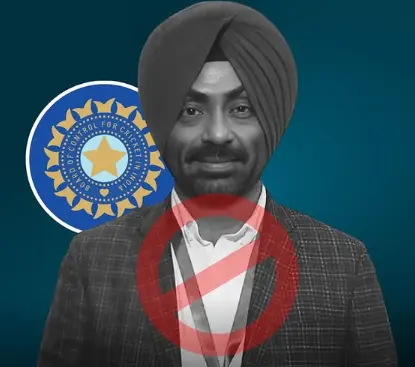The Board of Control for Cricket in India (BCCI) has formally banned team owner Gurmeet Singh Bhamrah for his alleged involvement in match-fixing activities, as part of a significant crackdown on corruption in cricket.
The BCCI's Anti-Corruption Unit (ACU) made the announcement after a comprehensive investigation that revealed strong evidence indicating that Bhamrah was connected to manipulating match results and engaging in activities aimed at unlawful personal gain. The disciplinary committee of BCCI unanimously approved the decision to impose a lifelong suspension.

Bhamrah is now prohibited from being involved in or associated with any cricketing activity approved by the BCCI, including franchise leagues, managerial positions, and event participation. This action reinforces the board's zero-tolerance approach against corruption in the game.
Gurmeet Singh Bhamrah was under surveillance for months, according to BCCI sources, after suspicious match patterns and irregular external activities were discovered during domestic T20 matches.
The Anti-Corruption Unit, working closely with law enforcement and regulatory authorities, identified meetings, financial transactions, and detailed emails which point to intentional match manipulation.
It has been claimed that Bhamrah, by using his influence over player management and team selection, manipulated results to benefit certain external entities engaged in illegal practices.
While none of the players have been listed as accused yet, some were interviewed during the investigation. The head of the ACU emphasized the need for constant vigilance to safeguard Indian cricket's integrity against both internal and external threats.
The news of Bhamrah's ban has triggered reactions from former cricketers, analysts, and team officials. Many praised the BCCI's firm decision, calling it essential for restoring public trust in the sport. "This is a wake-up call," said a former national player. "The game must remain clean, and owners must be held to the same standards as players." The BCCI's prompt action is being seen as a message to others involved in cricket administration and team ownership that unethical behavior will not be tolerated.
In light of cricket's growing commercial significance, experts believe that additional scrutiny, transparency, and background checks on club owners are more crucial than ever.
In the wake of this event, the BCCI plans to implement more stringent rules for club ownership, franchise registration, and internal monitoring mechanisms. New anti-corruption workshops and mandatory disclosure obligations for management personnel will be introduced.
By establishing a private whistleblower portal, players and employees may also be encouraged to report suspicious activity without fear of retaliation. "Cricket is not just a sport in India—it's an emotion. We are committed to safeguarding it," a BCCI spokesperson said. The Gurmeet Singh Bhamrah case serves as a bold precedent, reminding everyone that no one is above the game and that integrity remains non-negotiable.